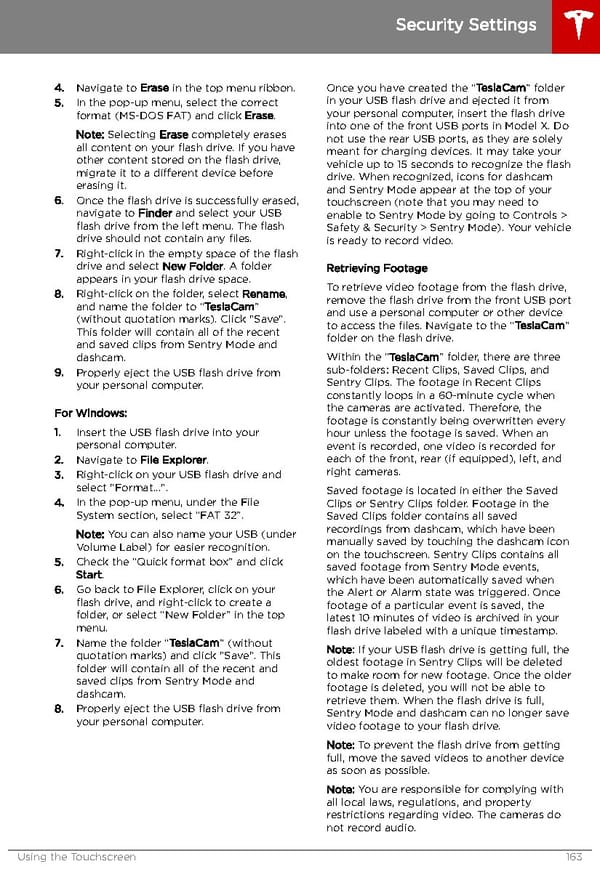Security Settings 4. Navigate to Erase in the top menu ribbon. Once you have created the “TeslaCam” folder 5. In the pop-up menu, select the correct in your USB flash drive and ejected it from format (MS-DOS FAT) and click Erase. your personal computer, insert the flash drive Note: Selecting Erase completely erases into one of the front USB ports in Model X. Do all content on your flash drive. If you have not use the rear USB ports, as they are solely other content stored on the flash drive, meant for charging devices. It may take your migrate it to a different device before vehicle up to 15 seconds to recognize the flash erasing it. drive. When recognized, icons for dashcam and Sentry Mode appear at the top of your 6. Once the flash drive is successfully erased, touchscreen (note that you may need to navigate to Finder and select your USB enable to Sentry Mode by going to Controls > flash drive from the left menu. The flash Safety & Security > Sentry Mode). Your vehicle drive should not contain any files. is ready to record video. 7. Right-click in the empty space of the flash drive and select New Folder. A folder Retrieving Footage appears in your flash drive space. To retrieve video footage from the flash drive, 8. Right-click on the folder, select Rename, remove the flash drive from the front USB port and name the folder to “TeslaCam” and use a personal computer or other device (without quotation marks). Click "Save". to access the files. Navigate to the “TeslaCam” This folder will contain all of the recent folder on the flash drive. and saved clips from Sentry Mode and dashcam. Within the “TeslaCam” folder, there are three 9. Properly eject the USB flash drive from sub-folders: Recent Clips, Saved Clips, and your personal computer. Sentry Clips. The footage in Recent Clips constantly loops in a 60-minute cycle when For Windows: the cameras are activated. Therefore, the footage is constantly being overwritten every 1. Insert the USB flash drive into your hour unless the footage is saved. When an personal computer. event is recorded, one video is recorded for 2. Navigate to File Explorer. each of the front, rear (if equipped), left, and 3. Right-click on your USB flash drive and right cameras. select "Format...". Saved footage is located in either the Saved 4. In the pop-up menu, under the File Clips or Sentry Clips folder. Footage in the System section, select “FAT 32”. Saved Clips folder contains all saved Note: You can also name your USB (under recordings from dashcam, which have been Volume Label) for easier recognition. manually saved by touching the dashcam icon 5. Check the “Quick format box” and click on the touchscreen. Sentry Clips contains all Start. saved footage from Sentry Mode events, which have been automatically saved when 6. Go back to File Explorer, click on your the Alert or Alarm state was triggered. Once flash drive, and right-click to create a footage of a particular event is saved, the folder, or select “New Folder” in the top latest 10 minutes of video is archived in your menu. flash drive labeled with a unique timestamp. 7. Name the folder “TeslaCam” (without Note: If your USB flash drive is getting full, the quotation marks) and click "Save". This oldest footage in Sentry Clips will be deleted folder will contain all of the recent and to make room for new footage. Once the older saved clips from Sentry Mode and footage is deleted, you will not be able to dashcam. retrieve them. When the flash drive is full, 8. Properly eject the USB flash drive from Sentry Mode and dashcam can no longer save your personal computer. video footage to your flash drive. Note: To prevent the flash drive from getting full, move the saved videos to another device as soon as possible. Note: You are responsible for complying with all local laws, regulations, and property restrictions regarding video. The cameras do not record audio. Using the Touchscreen 163
 Tesla Model X | Owner's Manual Page 163 Page 165
Tesla Model X | Owner's Manual Page 163 Page 165